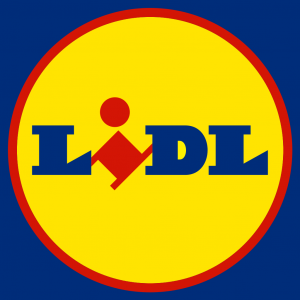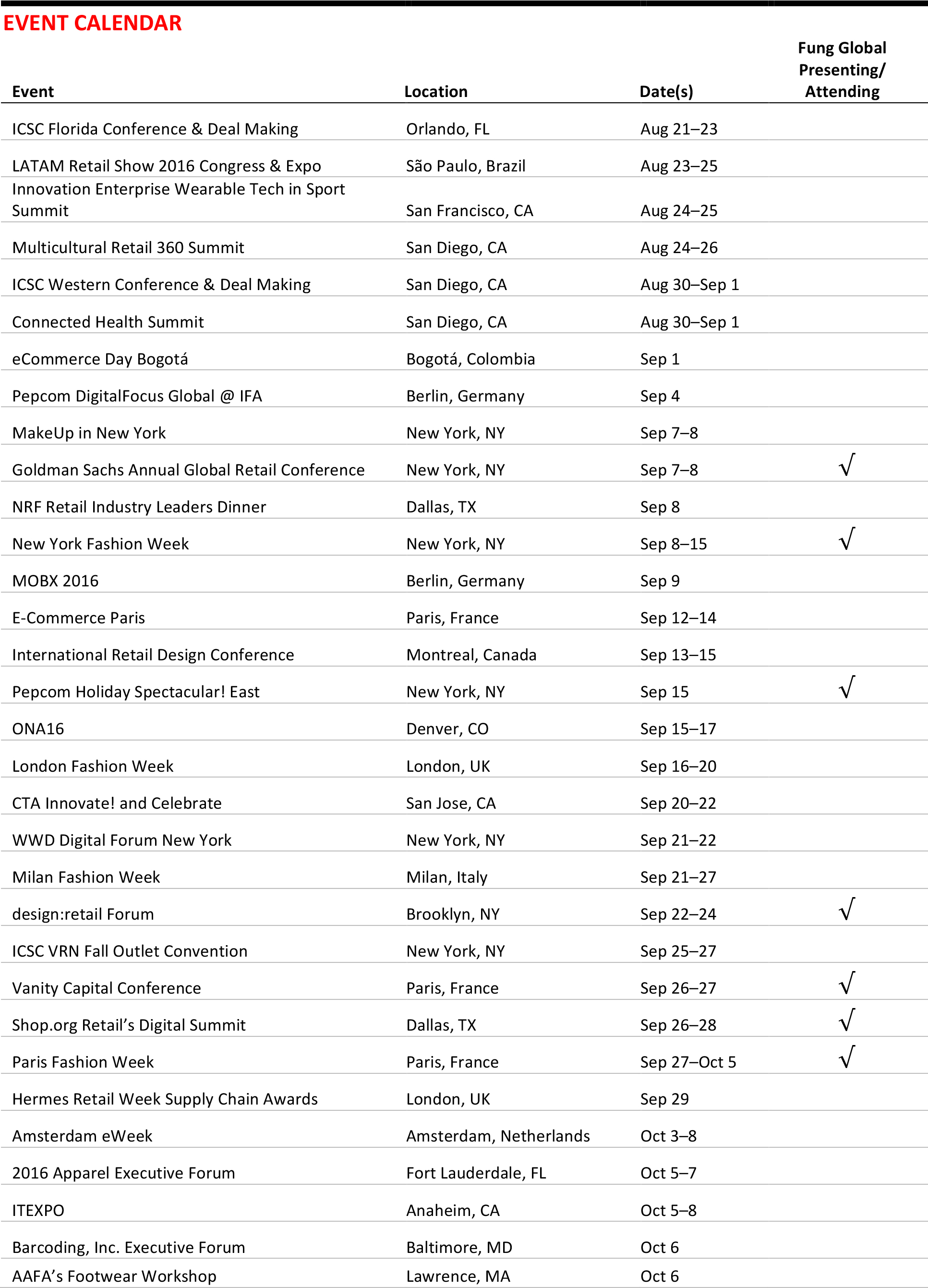
FROM THE DESK OF DEBORAH WEINSWIG
There Is Magic in Las Vegas Again!

This week, the Fung Global Retail & Technology team attended the MAGIC trade show, which is held in Las Vegas twice a year, in February and August. Initially, MAGIC exclusively focused on menswear, but the event’s scope has been expanded and the producers now call it the world’s largest fashion marketplace. In addition to menswear, the show now features areas devoted womenswear, clothing for juniors and children, footwear, accessories, and resources, among others.
Fung Global Retail & Technology and First Insight cohosted a Breakfast with The Disruptors event at PROJECT, one of the exposition areas at MAGIC, in conjunction with P1VOT, which is a new show floor area highlighting innovative, tech-based business solutions for designers and retailers. In advance of this event, we teamed with First Insight to conduct a survey designed to gauge retail industry opinion on the holiday 2016 season—and the outlook is positive. The breakfast panel discussion centered on the menswear market and covered a wide range of topics, including “The Consumer Is Not Brand Loyal, but How Can Retailers Take Advantage of That?”; “Pricing Down in the Men’s Category; Retailers Have to be Creative in Communicating the Value Message”; and “The Tie Is Not Dead; Men Taking More Risks in Fashion.”
The Fung Global Retail & Technology team compiled 10 key takeaways from the MAGIC show:
Influencers are enhancing the buy-now, wear-now fashion cycle. Influencers are becoming even more important to brands’ marketing strategies, and as the fashion cycle shortens, consumers are seeking alternative sources for style inspiration.
Snapchat is the new Instagram. Social media was a hot topic at the trade show. Instagram has long been touted as the best social media platform for fashion brands and retailers, but panelists at our Disruptors breakfast event highlighted the importance of Snapchat and Instagram Stories for brands and influencers.
The power balance between brands and retailers is shifting. E-commerce is giving brands more control of their distribution and more brands are operating their own stores, which heaps pressure on department stores to offer a compelling experience to consumers.
Department stores are focusing on quality, not quantity. There have been recent announcements of department-store closures, which will allow the affected companies to focus more of their time and energy on fewer stores and make a more dramatic impact with their overall offering.
Under Armour is at the forefront of automated manufacturing and smart fabrics. The company sees the ability to respond to customers’ needs and wants by manufacturing in local markets as crucial to the future of retail, and so is working to develop new technologies related to manufacturing automation. It is also a leader in the development of smart fabrics.
Retailers continue to seek celebrity partnerships. At FN Platform, the footwear expo at MAGIC, pop star Katy Perry debuted her new shoe line with Global Brands Group. The line reflects her whimsical style and features automobile-inspired elements and colorful stars.
3D printing, design and scanning: the new roadmap to the footwear of the future. The footwear industry is innovating using 3D printing, 3D design and 3D scanning. Printed fashion is becoming less futuristic and more of a reality.
Loyalty programs and customer service are key in changing the retail environment. Customer loyalty programs and exquisite customer service can drive revenue, as 10% of loyal store traffic represents 50% of revenue, while 45% of nonloyal store traffic generates only 5% of revenue.
Returns and reverse logistics are increasingly becoming an issue for retailers. In-store and online returns hit an all-time high of $284 billion last year and were up 6.2% year over year. E-commerce returns totaled 33%, apparel returns totaled 60% and brick-and-mortar returns remained steady.
Consumers are willing to buy more at full price. Consumers are willing to spend more on classic, timeless pieces because they believe they will get more wear out of them, according to panelists.
The Fung Global Retail & Technology team is looking forward to publishing additional reports about other key trade shows and events throughout the year.

US RETAIL EARNINGS

Source: Company reports
US RETAIL & TECH HEADLINES
 Rent the Runway Uses Employees and Snapchat to Find Customers the Right Fit
(August 15) Glossy
Rent the Runway Uses Employees and Snapchat to Find Customers the Right Fit
(August 15) Glossy
- Two weeks ago, Rent the Runway began using Snapchat and a team of 250 employees to help customers find the right fit. When the company receives a request, the employee who most resembles the customer models dresses over Snapchat to help ensure the customer gets the best fit possible before ordering.
- Rent the Runway says the entire interaction should take only about 10 minutes, but that getting dresses from the warehouse takes about a day. With a typical rental window of four days, customers do not have time to make returns. Since launching the service, Rent the Runway has received about 25 inquiries per week.
 US E-Commerce Posts Its Largest Gain in Nearly Two Years
(August 16) Internet Retailer
US E-Commerce Posts Its Largest Gain in Nearly Two Years
(August 16) Internet Retailer
- E-commerce sales were up 15.8% year over year in the second quarter, according to the US Department of Commerce. Online sales reached $91.24 billion in the quarter, representing the greatest year-over-year growth since the third quarter of 2014.
- Excluding items not typically bought online, such as autos and fuel, e-commerce represented about 10.9% of total nonadjusted retail sales during the second quarter, up slightly from 10.8% a year ago, according to Internet Retailer.
 Millennials Will Be the Last Globalized Generation
(August 16) Forbes
Millennials Will Be the Last Globalized Generation
(August 16) Forbes
- While globalization has been a big topic over the last 50 years, shopping local is the new attraction. Local farmers’ markets and 3D printing are bringing consumers full circle, transitioning them back to local goods.
- Renewable energy, 3D printing, virtual reality and indoor agriculture are all contributing to this transition. Ultimately, technology may nudge the world away from globalization as societies rely on new manufacturing techniques and labor sources—such as robots—to reduce costs.
 McDonald’s Serving Up Fitness Trackers in Happy Meals
(August 17) USA Today
McDonald’s Serving Up Fitness Trackers in Happy Meals
(August 17) USA Today
- For a limited time, McDonald’s will be giving away fitness trackers with Happy Meals, replacing the plastic figurine or toy that is typically included. The fitness tracker will come in six colors and will count steps and blink according to how quickly the wearer is moving.
- This changeup is in response to critics who say the company is pushing junk food to kids. The promotion is aimed at getting kids to be active and lead a healthy lifestyle.
EUROPE RETAIL EARNINGS

Source: Company reports
EUROPE RETAIL HEADLINES
 Germany’s Lidl Invests in Consumer Analysis
(August 12) Retaildetail.eu
Germany’s Lidl Invests in Consumer Analysis
(August 12) Retaildetail.eu
- In pursuit of a more modern and flexible business intelligence system, German discount chain Lidl is currently spending millions on new IT systems that can analyze consumer data.
- Lidl’s goal is reportedly to optimize its product range, pricing, consumer communication and discounts in order to gain an edge over rivals.
 John Lewis Plans to Help Local Producers
(August 16) Retailgazette.co.uk
John Lewis Plans to Help Local Producers
(August 16) Retailgazette.co.uk
- UK department store John Lewis has announced a project, named Locally Made, through which it will dedicate portions of its stores to locally designed and manufactured products.
- Starting in the city of Leeds, the project will see 120 products from within 30 miles stocked in-store. In the coming months, John Lewis intends to expand the project across the UK, including to stores in Edinburgh, Cardiff and London.
 Morrisons to Divert 1,000 Head Office Staff Due to Expected Consumer Influx
(August 8) Retail-week.com
Morrisons to Divert 1,000 Head Office Staff Due to Expected Consumer Influx
(August 8) Retail-week.com
- UK supermarket chain Morrisons is moving head office staff into stores, reportedly to cope with an expected heatwave-driven rush of customers. The move will see lawyers and IT staff working registers and stocking shelves, giving the retailer an extra 8,000 hours of service in stores.
- Morrisons, Britain’s fourth-largest supermarket, forecasts it will sell 42,000 burger buns and 70,000 bottles of water over the coming days, and that ice lolly sales will rise by 250%.
 Steinhoff’s Increased Bid Accepted by Poundland
(August 11) Retail-week.com
Steinhoff’s Increased Bid Accepted by Poundland
(August 11) Retail-week.com
- British discount chain Poundland has accepted an increased offer from South African retail group Steinhoff. The group upped its offer by 5 pence, to 225 pence per share, valuing the business at £610.4 million (US$795 million). This follows pressure from shareholder Elliott Advisors, which built its stake in the discount retailer last month.
- Poundland’s directors have said that the revised amount is “fair and reasonable.
 Post-Brexit-Vote UK Remains Attractive to Zalando
(August 11) UK.reuters.com
Post-Brexit-Vote UK Remains Attractive to Zalando
(August 11) UK.reuters.com
- Europe’s largest online-only fashion retailer, Zalando, sees growing opportunities in Britain, according to managing board member Rubin Ritter. However, the UK contributes only a “very small” share of the company’s total sales, he noted in a recent conference call.
- Ritter said that the UK’s vote to leave the EU had not changed Zalando’s strategy in the country and that the company still perceives it as an attractive potential market. He said that Zalando has added more UK-based brands to its offering.
ASIA TECH HEADLINES
 Tencent Leads the Financing of Douyu TV
(August 16) e27.co
Tencent Leads the Financing of Douyu TV
(August 16) e27.co
- Douyu TV, a runner-up in China’s live-streaming market, announced that it has secured a series C financing round of ¥1.5 billion (US$226 million), led by Tencent and Phoenix Capital.
- Six of the 10 most popular games in the first half of 2016 are produced by Tencent, which has been actively investing in gaming-related business. China’s mobile-gaming industry generated ¥29 billion (US$4.4 billion) in revenue in the first two quarters of this year.
 India’s Fund to Invest in Oil and Gas Startups
(August 15) TechinAsia
India’s Fund to Invest in Oil and Gas Startups
(August 15) TechinAsia
- Oil and Natural Gas Corporation, an Indian multinational oil and gas company owned by the government, announced its plan to invest in startups with a US$15 million fund. The company will provide seed capital, mentoring and connections to participating startups.
- The Indian government will be looking at more oil and gas startups in the near future, after having seen the growth of the shale oil sector in the US.
 Thailand’s Firms Produce Robots for Aging Population
(August 15) Reuters
Thailand’s Firms Produce Robots for Aging Population
(August 15) Reuters
- Many Thai firms are investing heavily in healthcare for the aging population, as Thailand will see those over 60 account for more than 15% of the total population by the end of 2016. This figure is estimated to reach 20% by 2020.
- CT Asia Robotics is one of these companies. Its elderly care robot, Dinsow, can keep track of elderly consumers’ medication, video-phone their relatives, exercise together with them and even entertain them with karaoke skills.
 SK Telecom Collaborates with Verizon to Codevelop 5G Specifications
(August 15) ZDNet
SK Telecom Collaborates with Verizon to Codevelop 5G Specifications
(August 15) ZDNet
- SK Telecom, South Korea’s largest mobile carrier, announced it will collaborate with Verizon, the US’s biggest telco, to develop 5G technical specifications together.
- The companies will cooperate in areas that include the Open Computer Project, which is focused on redesigning hardware tech to better support computing infrastructure, and Mobile Central Office Rearchitected as a Datacenter.
LATAM RETAIL HEADLINES
 Walmex Agrees to Sell Suburbia Clothing Chain to Liverpool for US$1 Billion
(August 10) Bloomberg
Walmex Agrees to Sell Suburbia Clothing Chain to Liverpool for US$1 Billion
(August 10) Bloomberg
- Walmart’s Mexican division (Walmex) agreed to sell its Suburbia clothing chain to El Puerto de Liverpool, the largest department-store operator in Mexico, for MXN 19 billion (US$1.0 billion) in cash, the assumption of debt and an earn-out after the deal closes.
- The deal covers 119 stores, and Liverpool will have to pay rent to Walmex on 34 locations where the two companies’ stores are located next to each other. Walmex no longer considers the Suburbia business a core part of its discount retail and grocery stores.
 Brazil’s Economy Grows in June as Confidence Improves
(August 13) The Salt Lake Tribune
Brazil’s Economy Grows in June as Confidence Improves
(August 13) The Salt Lake Tribune
- The Brazilian central bank’s economic activity index, a proxy for GDP, marked its best performance since December 2014 when it rose by a seasonally adjusted 0.23% in June from May, after falling a revised 0.45% in May. Bloomberg had reported a consensus estimate of 0.2% growth.
- Financial markets have risen on the hope that the impeachment of President Dilma Rousseff will be decided in August, freeing acting President Michel Temer to enact reforms and attract investment.
 Lojas Americanas Beats Profit Estimates in Second Quarter
(August 12) Bloomberg
Lojas Americanas Beats Profit Estimates in Second Quarter
(August 12) Bloomberg
- Lojas Americanas, Brazil’s largest publicly traded retailer, reported second-quarter EBITDA of R$453 million (US$143 million) on flat revenues, exceeding estimates of R$377 million (US$118 million) from Itaú and R$390 million (US$122 million) from Credit Suisse.
- The company is focusing on logistics and private-label products to improve margins, and benefited from the timing of the Easter holiday this year as well as from its product diversity.
 E-Commerce in Brazil Continues to Grow Despite Economic Situation
(August 14) PracticalEcommerce.com
E-Commerce in Brazil Continues to Grow Despite Economic Situation
(August 14) PracticalEcommerce.com
- According to Brazil’s National Confederation of Industry, 59% of Brazilians have experienced a loss in purchasing power, and the country’s slowing economy has affected overall growth projections of online sales in Latin America. Retail sales growth in Latin America slipped from 5.5% in 2014 to 5.0% in 2016, according to eMarketer.
- Still, Brazilians have not stopped buying completely—they are just more cautious and are searching online for more information, comparing prices and features before deciding to buy a product or service. In the first quarter of 2016, revenue from e-commerce reached R$9.75 billion (US$3.14 billion), representing roughly 106 million products, according to research firm E-bit.
 Some Private-Equity Firms Undaunted by Brazil’s Recession
(August 15) Bloomberg
Some Private-Equity Firms Undaunted by Brazil’s Recession
(August 15) Bloomberg
- US private-equity firm General Atlantic has already invested more than R$1 billion (US$318 million) in Brazil this year, and it plans to keep investing despite valuations “that are not cheap.”
- The firm is targeting companies in unregulated industries that focus on middle-class and upper-class consumers, such as brokerage XP Investimentos CCTVM and drugstore chain Pague Menos. General Atlantic is passing on infrastructure deals despite the new opportunities that have been created following the Operation Car Wash corruption investigation at Petrobrás.
�




 This week, the Fung Global Retail & Technology team attended the MAGIC trade show, which is held in Las Vegas twice a year, in February and August. Initially, MAGIC exclusively focused on menswear, but the event’s scope has been expanded and the producers now call it the world’s largest fashion marketplace. In addition to menswear, the show now features areas devoted womenswear, clothing for juniors and children, footwear, accessories, and resources, among others.
Fung Global Retail & Technology and First Insight cohosted a Breakfast with The Disruptors event at PROJECT, one of the exposition areas at MAGIC, in conjunction with P1VOT, which is a new show floor area highlighting innovative, tech-based business solutions for designers and retailers. In advance of this event, we teamed with First Insight to conduct a survey designed to gauge retail industry opinion on the holiday 2016 season—and the outlook is positive. The breakfast panel discussion centered on the menswear market and covered a wide range of topics, including “The Consumer Is Not Brand Loyal, but How Can Retailers Take Advantage of That?”; “Pricing Down in the Men’s Category; Retailers Have to be Creative in Communicating the Value Message”; and “The Tie Is Not Dead; Men Taking More Risks in Fashion.”
The Fung Global Retail & Technology team compiled 10 key takeaways from the MAGIC show:
Influencers are enhancing the buy-now, wear-now fashion cycle. Influencers are becoming even more important to brands’ marketing strategies, and as the fashion cycle shortens, consumers are seeking alternative sources for style inspiration.
Snapchat is the new Instagram. Social media was a hot topic at the trade show. Instagram has long been touted as the best social media platform for fashion brands and retailers, but panelists at our Disruptors breakfast event highlighted the importance of Snapchat and Instagram Stories for brands and influencers.
The power balance between brands and retailers is shifting. E-commerce is giving brands more control of their distribution and more brands are operating their own stores, which heaps pressure on department stores to offer a compelling experience to consumers.
Department stores are focusing on quality, not quantity. There have been recent announcements of department-store closures, which will allow the affected companies to focus more of their time and energy on fewer stores and make a more dramatic impact with their overall offering.
Under Armour is at the forefront of automated manufacturing and smart fabrics. The company sees the ability to respond to customers’ needs and wants by manufacturing in local markets as crucial to the future of retail, and so is working to develop new technologies related to manufacturing automation. It is also a leader in the development of smart fabrics.
Retailers continue to seek celebrity partnerships. At FN Platform, the footwear expo at MAGIC, pop star Katy Perry debuted her new shoe line with Global Brands Group. The line reflects her whimsical style and features automobile-inspired elements and colorful stars.
3D printing, design and scanning: the new roadmap to the footwear of the future. The footwear industry is innovating using 3D printing, 3D design and 3D scanning. Printed fashion is becoming less futuristic and more of a reality.
Loyalty programs and customer service are key in changing the retail environment. Customer loyalty programs and exquisite customer service can drive revenue, as 10% of loyal store traffic represents 50% of revenue, while 45% of nonloyal store traffic generates only 5% of revenue.
Returns and reverse logistics are increasingly becoming an issue for retailers. In-store and online returns hit an all-time high of $284 billion last year and were up 6.2% year over year. E-commerce returns totaled 33%, apparel returns totaled 60% and brick-and-mortar returns remained steady.
Consumers are willing to buy more at full price. Consumers are willing to spend more on classic, timeless pieces because they believe they will get more wear out of them, according to panelists.
The Fung Global Retail & Technology team is looking forward to publishing additional reports about other key trade shows and events throughout the year.
This week, the Fung Global Retail & Technology team attended the MAGIC trade show, which is held in Las Vegas twice a year, in February and August. Initially, MAGIC exclusively focused on menswear, but the event’s scope has been expanded and the producers now call it the world’s largest fashion marketplace. In addition to menswear, the show now features areas devoted womenswear, clothing for juniors and children, footwear, accessories, and resources, among others.
Fung Global Retail & Technology and First Insight cohosted a Breakfast with The Disruptors event at PROJECT, one of the exposition areas at MAGIC, in conjunction with P1VOT, which is a new show floor area highlighting innovative, tech-based business solutions for designers and retailers. In advance of this event, we teamed with First Insight to conduct a survey designed to gauge retail industry opinion on the holiday 2016 season—and the outlook is positive. The breakfast panel discussion centered on the menswear market and covered a wide range of topics, including “The Consumer Is Not Brand Loyal, but How Can Retailers Take Advantage of That?”; “Pricing Down in the Men’s Category; Retailers Have to be Creative in Communicating the Value Message”; and “The Tie Is Not Dead; Men Taking More Risks in Fashion.”
The Fung Global Retail & Technology team compiled 10 key takeaways from the MAGIC show:
Influencers are enhancing the buy-now, wear-now fashion cycle. Influencers are becoming even more important to brands’ marketing strategies, and as the fashion cycle shortens, consumers are seeking alternative sources for style inspiration.
Snapchat is the new Instagram. Social media was a hot topic at the trade show. Instagram has long been touted as the best social media platform for fashion brands and retailers, but panelists at our Disruptors breakfast event highlighted the importance of Snapchat and Instagram Stories for brands and influencers.
The power balance between brands and retailers is shifting. E-commerce is giving brands more control of their distribution and more brands are operating their own stores, which heaps pressure on department stores to offer a compelling experience to consumers.
Department stores are focusing on quality, not quantity. There have been recent announcements of department-store closures, which will allow the affected companies to focus more of their time and energy on fewer stores and make a more dramatic impact with their overall offering.
Under Armour is at the forefront of automated manufacturing and smart fabrics. The company sees the ability to respond to customers’ needs and wants by manufacturing in local markets as crucial to the future of retail, and so is working to develop new technologies related to manufacturing automation. It is also a leader in the development of smart fabrics.
Retailers continue to seek celebrity partnerships. At FN Platform, the footwear expo at MAGIC, pop star Katy Perry debuted her new shoe line with Global Brands Group. The line reflects her whimsical style and features automobile-inspired elements and colorful stars.
3D printing, design and scanning: the new roadmap to the footwear of the future. The footwear industry is innovating using 3D printing, 3D design and 3D scanning. Printed fashion is becoming less futuristic and more of a reality.
Loyalty programs and customer service are key in changing the retail environment. Customer loyalty programs and exquisite customer service can drive revenue, as 10% of loyal store traffic represents 50% of revenue, while 45% of nonloyal store traffic generates only 5% of revenue.
Returns and reverse logistics are increasingly becoming an issue for retailers. In-store and online returns hit an all-time high of $284 billion last year and were up 6.2% year over year. E-commerce returns totaled 33%, apparel returns totaled 60% and brick-and-mortar returns remained steady.
Consumers are willing to buy more at full price. Consumers are willing to spend more on classic, timeless pieces because they believe they will get more wear out of them, according to panelists.
The Fung Global Retail & Technology team is looking forward to publishing additional reports about other key trade shows and events throughout the year.


 McDonald’s Serving Up Fitness Trackers in Happy Meals
(August 17) USA Today
McDonald’s Serving Up Fitness Trackers in Happy Meals
(August 17) USA Today

 John Lewis Plans to Help Local Producers
(August 16) Retailgazette.co.uk
John Lewis Plans to Help Local Producers
(August 16) Retailgazette.co.uk
 India’s Fund to Invest in Oil and Gas Startups
(August 15) TechinAsia
India’s Fund to Invest in Oil and Gas Startups
(August 15) TechinAsia

